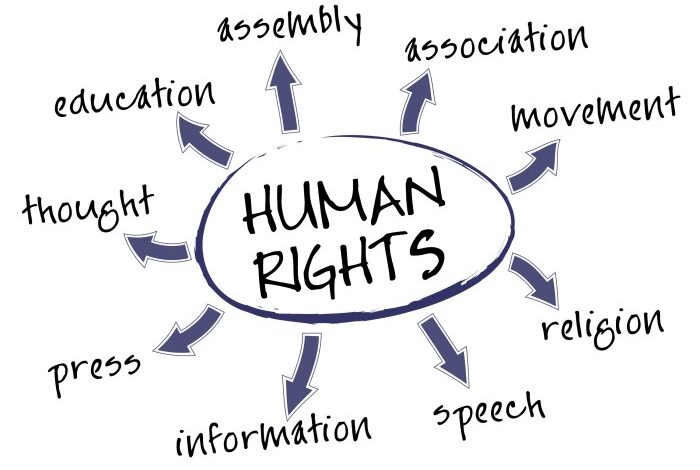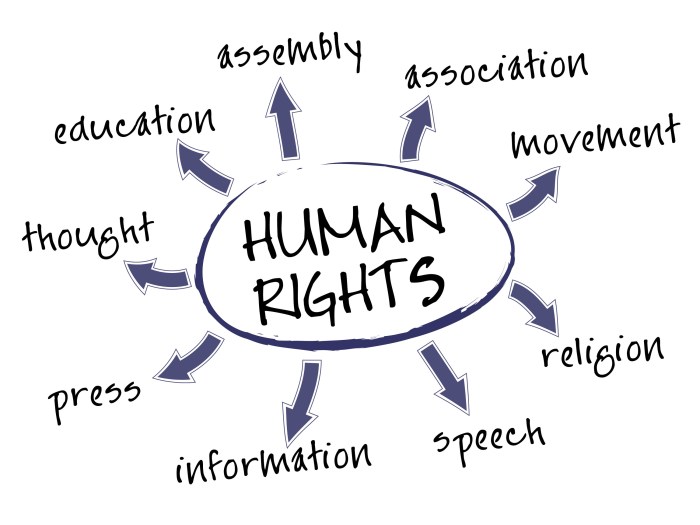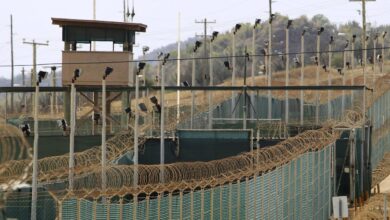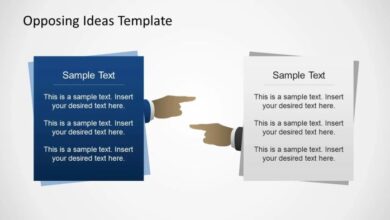
The USA and Human Rights: A Journey Through History and Challenges
The USA and human rights are intricately intertwined, forming a complex tapestry woven from historical struggles, legal battles, and ongoing social movements. This exploration delves into the nation’s evolving understanding of human rights, tracing its journey from the ideals of the Declaration of Independence to the present day’s ongoing fight for equality and justice.
From the fundamental rights enshrined in the Constitution to the challenges of social and economic inequality, we examine the US’s commitment to human rights and the hurdles it faces in upholding these ideals. We’ll explore the role of international human rights standards and the ongoing debate surrounding the USA’s approach to these critical issues.
Historical Context of Human Rights in the USA
The United States, founded on the principles of liberty and equality, has a long and complex history of human rights. From the initial struggle for independence to the ongoing fight for social justice, the evolution of human rights in the US has been shaped by various events, movements, and legal precedents.
The Declaration of Independence and the Early Years
The Declaration of Independence, adopted in 1776, laid the foundation for human rights in the US by declaring that all men are created equal and endowed with certain unalienable rights, including life, liberty, and the pursuit of happiness. However, this initial promise of equality was limited to white men, excluding women, enslaved people, and indigenous populations.
The Abolition of Slavery and the Civil War
The struggle for the abolition of slavery and the Civil War (1861-1865) marked a significant turning point in the development of human rights in the US. The Emancipation Proclamation in 1863 declared the freedom of enslaved people in Confederate states, and the 13th Amendment to the Constitution in 1865 officially abolished slavery.
However, the fight for racial equality continued long after the Civil War.
The Civil Rights Movement and the Fight for Equality
The Civil Rights Movement of the mid-20th century was a pivotal moment in the fight for equality and human rights for African Americans. This movement, fueled by the leadership of Martin Luther King Jr. and others, used nonviolent protests, sit-ins, and boycotts to challenge segregation and discrimination.
The Civil Rights Act of 1964 and the Voting Rights Act of 1965 were landmark pieces of legislation that outlawed discrimination based on race, color, religion, sex, or national origin.
The Women’s Rights Movement and the Fight for Gender Equality
The Women’s Rights Movement, which gained momentum in the 19th century and continued throughout the 20th century, fought for equal rights for women. The movement focused on issues such as suffrage, employment, education, and reproductive rights. The 19th Amendment in 1920 granted women the right to vote, and the Equal Pay Act of 1963 prohibited wage discrimination based on sex.
The LGBTQ+ Rights Movement and the Fight for Sexual Orientation and Gender Identity, The usa and human rights
The LGBTQ+ Rights Movement, which began in the late 20th century, has fought for equal rights and protections for lesbian, gay, bisexual, transgender, queer, and intersex individuals. This movement has challenged discrimination in areas such as employment, housing, and healthcare.
The Supreme Court ruling in Obergefell v. Hodges (2015) legalized same-sex marriage nationwide.
The Ongoing Fight for Human Rights
The fight for human rights in the US continues today, with ongoing efforts to address issues such as racial injustice, economic inequality, and the rights of immigrants and refugees. The US government has signed and ratified numerous international human rights treaties, including the Universal Declaration of Human Rights and the International Covenant on Civil and Political Rights.
However, there are ongoing concerns about the US’s record on human rights, particularly regarding issues such as mass incarceration, police brutality, and the treatment of immigrants.
Fundamental Rights and Liberties
The US Constitution, often hailed as the cornerstone of American democracy, lays out a framework for individual rights and liberties that have shaped the nation’s political and social landscape. The Bill of Rights, comprising the first ten amendments, explicitly Artikels these fundamental freedoms, safeguarding citizens from government encroachment.
Freedom of Speech, Religion, Assembly, and the Press
These rights, enshrined in the First Amendment, are considered the bedrock of American democracy. They enable individuals to express their views, practice their faith, gather with others, and disseminate information freely.
- Freedom of Speech:This right protects individuals’ ability to express themselves without fear of government censorship. It encompasses a wide range of speech, including political discourse, artistic expression, and even controversial or unpopular views. The Supreme Court has consistently upheld the importance of this freedom, recognizing its vital role in a democratic society.
For example, the landmark case of -Schenck v. United States* (1919) established the “clear and present danger” test, which allows the government to restrict speech only if it poses an imminent threat to national security. However, the Court has also acknowledged that certain types of speech, such as inciting violence or defamation, can be restricted.
- Freedom of Religion:The First Amendment prohibits the government from establishing a state religion or interfering with the free exercise of religion. This ensures that individuals can practice their faith without government interference. This freedom extends to both religious belief and practice. The Supreme Court has ruled in numerous cases that the government cannot discriminate against individuals based on their religious beliefs or practices.
For example, in -Wisconsin v. Yoder* (1972), the Court held that Amish parents could not be forced to send their children to public school beyond the eighth grade, as this violated their religious beliefs.
- Freedom of Assembly:This right allows individuals to gather peacefully and express their views on a variety of issues. It is crucial for political activism, social movements, and public discourse. The Supreme Court has upheld this right in numerous cases, recognizing its importance for a functioning democracy.
For example, in -National Socialist Party of America v. Village of Skokie* (1977), the Court ruled that the Nazi Party could hold a rally in a predominantly Jewish community, even though the event was likely to be met with protests and hostility.
The USA prides itself on being a beacon of freedom and human rights, but recent events have cast a shadow on this claim. The story of a Princeton professor and retired Marine potentially being placed on a government no-fly list for criticizing the White House, as reported in this article , raises serious concerns about the extent to which freedom of speech is truly upheld in the US.
This incident highlights the delicate balance between national security and individual liberties, and it’s a stark reminder that the fight for human rights is ongoing.
This decision underscored the importance of protecting even unpopular or controversial viewpoints from government censorship.
- Freedom of the Press:This right ensures that the media can report on matters of public interest without fear of government censorship or retaliation. A free press is essential for holding the government accountable and informing the public. The Supreme Court has consistently protected the freedom of the press, recognizing its crucial role in a democratic society.
For example, in -New York Times Co. v. Sullivan* (1964), the Court established the “actual malice” standard, which requires public officials to prove that a false statement was made with knowledge of its falsity or reckless disregard for the truth in order to win a libel suit.
This standard has made it significantly more difficult for public officials to sue for libel, thereby protecting the media’s ability to report on government activities.
Right to Due Process and Equal Protection
The Fourteenth Amendment guarantees due process and equal protection under the law. This means that the government must treat all individuals fairly and equally, regardless of their race, religion, gender, or other characteristics.
- Due Process:This principle ensures that individuals are treated fairly by the government and have the opportunity to be heard before their rights are taken away. The Fifth and Fourteenth Amendments guarantee due process, ensuring that individuals are protected from arbitrary or unfair government action.
The USA’s commitment to human rights is often touted, but sometimes actions speak louder than words. One area where this dissonance is apparent is in food aid, which can sometimes become a form of dumping, as discussed in this article.
While intended to help, this practice can undermine local markets and create dependence, ultimately hindering the long-term well-being of those it aims to support. This highlights the complex relationship between the USA’s foreign policy and its human rights agenda.
For example, in -Miranda v. Arizona* (1966), the Supreme Court established the “Miranda warnings,” which require law enforcement officers to inform suspects of their constitutional rights, including the right to remain silent and the right to an attorney, before questioning them.
This ensures that suspects are aware of their rights and can exercise them effectively.
- Equal Protection:This principle prohibits the government from discriminating against individuals based on certain protected characteristics, such as race, religion, gender, or national origin. The Fourteenth Amendment guarantees equal protection, ensuring that all individuals are treated equally under the law. For example, in -Brown v.
Board of Education* (1954), the Supreme Court ruled that racial segregation in public schools was unconstitutional, establishing the principle of “separate but equal” as inherently unequal. This landmark decision marked a significant turning point in the struggle for racial equality in the United States.
Social and Economic Rights
The debate surrounding social and economic rights in the United States is complex and multifaceted. While the US Constitution guarantees certain fundamental rights and liberties, such as freedom of speech and religion, it does not explicitly mention social and economic rights like the right to healthcare, education, or housing.
This has led to a long-standing debate about whether these rights should be enshrined in law and the role of the government in ensuring their fulfillment.
The US Approach to Social and Economic Rights
The US approach to social and economic rights is often characterized as more individualistic and market-oriented compared to other developed countries. This approach emphasizes individual responsibility, free market principles, and limited government intervention. The US generally relies on a combination of private and public initiatives to address social and economic needs, with a strong emphasis on individual self-reliance and private charity.
The USA’s commitment to human rights is often cited as a cornerstone of its foreign policy, but the reality on the ground is more complex. A closer look reveals that military expansion, often driven by economic objectives as outlined in this article on military expansion serving economic objectives , can sometimes clash with the principles of human rights.
Ultimately, the balance between these competing priorities shapes the USA’s global role and its impact on the lives of individuals around the world.
Comparison with Other Developed Countries
In contrast to the US, many other developed countries have adopted a more social democratic approach, recognizing social and economic rights as fundamental human rights and incorporating them into their constitutions or legal frameworks. These countries often have universal healthcare systems, publicly funded education, and robust social safety nets to ensure a basic standard of living for all citizens.
For example, Canada, the United Kingdom, and most European countries have universal healthcare systems that provide comprehensive medical care to all residents.
Level of Legal Protection for Social and Economic Rights in the US
The following table Artikels different social and economic rights and the level of legal protection they have in the US:
| Social and Economic Right | Level of Legal Protection | Example |
|---|---|---|
| Right to Healthcare | Limited | The Affordable Care Act (ACA) expanded access to healthcare, but millions remain uninsured, and healthcare costs remain high. |
| Right to Education | Limited | Public education is provided at the primary and secondary levels, but funding disparities exist between schools in different districts. |
| Right to Housing | Limited | While there are programs to assist low-income families with housing, homelessness remains a significant issue in many US cities. |
Challenges to Human Rights in the USA

Despite its founding principles of liberty and equality, the United States continues to grapple with significant challenges to human rights. Systemic racism, gender inequality, and poverty are deeply embedded in American society, impacting marginalized communities and hindering the realization of fundamental rights for all.
Racial Injustice
Racial injustice remains a pervasive issue in the United States, with a long history of systemic discrimination and violence against people of color. The legacy of slavery, Jim Crow laws, and ongoing racial profiling continues to manifest in disparities in areas such as criminal justice, healthcare, education, and economic opportunity.
Examples of Systemic Racism
- Mass Incarceration:The United States has the highest incarceration rate in the world, with disproportionately high rates of imprisonment for Black and Hispanic individuals. This is largely due to the War on Drugs, which has led to harsher sentencing for drug offenses and racial bias in policing and prosecution.
- Racial Wealth Gap:The racial wealth gap in the United States is vast and persistent. Black and Hispanic households have significantly less wealth than white households, due to historical and ongoing discrimination in areas such as housing, education, and employment.
- Police Brutality:The disproportionate use of force by law enforcement against people of color has been a recurring issue in the United States. High-profile cases such as the killings of George Floyd, Breonna Taylor, and Eric Garner have sparked widespread protests and calls for police reform.
Gender Inequality
Gender inequality persists in the United States, with women facing discrimination and barriers to equality in various spheres of life. This includes disparities in pay, representation in leadership positions, access to healthcare, and experiences of violence.
Examples of Gender Inequality
- Gender Pay Gap:Women in the United States earn less than men for doing the same work. The gender pay gap persists across different industries and occupations, with women of color facing the largest disparities.
- Underrepresentation in Leadership:Women are underrepresented in leadership positions in business, government, and other institutions. This lack of representation limits women’s influence and perpetuates gender stereotypes.
- Reproductive Rights:Access to reproductive healthcare, including abortion, is a contentious issue in the United States. Restrictions on abortion access disproportionately impact low-income women and women of color.
Poverty
Poverty is a significant challenge to human rights in the United States, affecting millions of people and contributing to a range of social problems. The lack of adequate income and resources can lead to food insecurity, homelessness, lack of access to healthcare, and educational disparities.
Examples of Poverty’s Impact on Human Rights
- Food Insecurity:Millions of Americans struggle with food insecurity, meaning they lack consistent access to adequate food. This can lead to malnutrition, health problems, and reduced educational outcomes.
- Homelessness:The United States has a significant problem with homelessness, with many people living on the streets or in shelters. This can lead to exposure to the elements, lack of sanitation, and vulnerability to crime.
- Healthcare Disparities:Poverty is a major factor in healthcare disparities in the United States. Low-income individuals have less access to quality healthcare, leading to poorer health outcomes and higher mortality rates.
International Human Rights Standards and the USA
The United States, a nation founded on principles of liberty and equality, has a complex and often contentious relationship with international human rights standards. While the US has played a significant role in shaping these standards, its domestic practices and foreign policy have sometimes diverged from the principles enshrined in international instruments.
This section examines the US’s engagement with international human rights, highlighting both its contributions and its challenges.
The US and International Human Rights Instruments
The US has a mixed record when it comes to ratifying and implementing international human rights instruments. While it has ratified some key treaties, such as the International Covenant on Civil and Political Rights (ICCPR) and the Convention on the Elimination of All Forms of Discrimination Against Women (CEDAW), it has notably not ratified the International Covenant on Economic, Social and Cultural Rights (ICESCR) or the Convention on the Rights of the Child (CRC).
- The US’s reluctance to ratify certain treaties stems from concerns about potential infringements on national sovereignty and its commitment to federalism. For instance, the US has argued that the ICESCR’s provisions on economic and social rights could lead to government intervention in the private sector and infringe upon individual liberties.
- The US’s position on international human rights instruments has also been influenced by political considerations. During the Cold War, the US often opposed human rights treaties perceived as promoting socialist or communist ideologies.
- However, the US has actively participated in the development and implementation of many international human rights standards, including the Universal Declaration of Human Rights (UDHR), which it helped draft in 1948.
US Approach to Human Rights Compared to International Standards
The US approach to human rights is often characterized as “liberal internationalism,” emphasizing individual rights and freedoms, particularly civil and political rights. This approach has been criticized for its focus on Western values and its tendency to overlook economic and social rights, which are central to many international human rights instruments.
- For example, the US has often prioritized the promotion of democracy and free markets in its foreign policy, sometimes at the expense of addressing issues such as poverty, inequality, and access to healthcare.
- The US has also been criticized for its use of military force and its involvement in wars that have resulted in civilian casualties and human rights violations.
- Despite these criticisms, the US has made significant contributions to the advancement of human rights globally. It has played a leading role in promoting human rights through international organizations, such as the United Nations, and through its own diplomatic efforts.
The US Role in Promoting and Protecting Human Rights Globally
The US has a complex and evolving role in promoting and protecting human rights globally. Its approach has been influenced by various factors, including its domestic political climate, its foreign policy priorities, and its relationship with other countries.
- The US has a long history of providing humanitarian assistance and supporting human rights organizations around the world. It has also played a significant role in establishing international human rights mechanisms, such as the International Criminal Court (ICC).
- However, the US has also been criticized for its support of authoritarian regimes and its use of sanctions and military interventions that have sometimes undermined human rights.
- The US’s approach to human rights has been particularly contentious in recent years, with the Trump administration’s withdrawal from the Human Rights Council and its emphasis on “America First” policies.
- Despite these challenges, the US remains a significant player in the global human rights landscape. Its actions and policies continue to have a profound impact on the lives of millions of people around the world.
Future Directions for Human Rights in the USA: The Usa And Human Rights
The United States, despite its commitment to human rights, faces persistent challenges in upholding these fundamental principles for all its citizens. The path towards a more just and equitable society necessitates a proactive approach to addressing these challenges and strengthening human rights protections.
This section explores key areas where progress is urgently needed and Artikels potential solutions and strategies for achieving meaningful change.
Strengthening Protections Against Discrimination
Discrimination based on race, ethnicity, gender, sexual orientation, religion, and other factors continues to be a pervasive issue in the US. The persistent disparities in access to education, healthcare, employment, and housing underscore the need for comprehensive reforms to address systemic discrimination.
- Enhancing Enforcement of Anti-Discrimination Laws:The Civil Rights Act of 1964 and other anti-discrimination laws need robust enforcement mechanisms to effectively combat discrimination in all its forms. This includes strengthening the Equal Employment Opportunity Commission (EEOC) and other agencies tasked with enforcing these laws, providing adequate funding, and empowering them to pursue systemic investigations and hold perpetrators accountable.
- Addressing Implicit Bias:Implicit bias, unconscious prejudices that can influence decision-making, is a significant contributor to discrimination. Implementing mandatory anti-bias training for law enforcement, educators, and other professionals can help mitigate the impact of implicit bias and promote more equitable outcomes.
- Data Collection and Transparency:Comprehensive data collection on discrimination is essential for identifying patterns, measuring progress, and developing effective solutions. Requiring government agencies and private institutions to collect and publicly report data on discrimination in various areas, such as employment, housing, and healthcare, can increase transparency and accountability.
Protecting the Rights of Immigrants and Refugees
The United States has a long history of welcoming immigrants and refugees, but recent policies have raised concerns about the protection of their human rights. Addressing these concerns requires a humane and just approach to immigration and refugee policies.
- Due Process and Fair Treatment:Ensuring due process and fair treatment for all immigrants, regardless of their immigration status, is crucial. This includes providing access to legal representation, protecting asylum seekers from arbitrary detention, and ensuring that deportation proceedings are fair and transparent.
- Family Reunification:Policies that separate families at the border violate the fundamental right to family unity. Prioritizing family reunification and ensuring that children are not separated from their parents should be a cornerstone of immigration policy.
- Path to Citizenship:Creating a pathway to citizenship for undocumented immigrants would provide a more humane and just solution to the challenges of immigration. It would also allow these individuals to fully participate in society and contribute to the economy.
Guaranteeing Access to Healthcare
Access to healthcare is a fundamental human right, but millions of Americans lack adequate healthcare coverage. Expanding access to affordable healthcare is essential for ensuring the well-being of all Americans.
- Expanding Medicaid Coverage:Expanding Medicaid coverage to more low-income individuals and families would ensure that millions more Americans have access to essential healthcare services.
- Lowering Prescription Drug Costs:High prescription drug costs are a significant barrier to access to healthcare. Implementing measures to lower prescription drug costs, such as allowing Medicare to negotiate drug prices and expanding access to generic drugs, would make healthcare more affordable for millions of Americans.
- Addressing Health Disparities:Health disparities based on race, ethnicity, and socioeconomic status are a persistent problem in the US. Addressing these disparities requires investments in community health centers, culturally competent healthcare providers, and programs that promote health equity.
Promoting Economic Justice
Economic inequality is a major human rights concern in the US. Millions of Americans struggle to make ends meet, while a small percentage of the population controls a disproportionate share of wealth. Addressing economic inequality requires policies that promote economic justice.
- Raising the Minimum Wage:A living wage is essential for ensuring that all workers can afford basic necessities. Raising the federal minimum wage to a level that reflects the cost of living would help millions of low-wage workers.
- Strengthening Labor Unions:Labor unions play a vital role in protecting workers’ rights and promoting economic justice. Strengthening labor unions by making it easier for workers to organize and bargain collectively would empower workers to negotiate fair wages and working conditions.
- Investing in Affordable Housing:The lack of affordable housing is a major crisis in many US cities. Investing in affordable housing construction and expanding rental assistance programs would help ensure that all Americans have access to safe and affordable housing.
Protecting the Environment
Climate change poses a significant threat to human rights, particularly for vulnerable populations. Addressing climate change requires a comprehensive approach that protects the environment and promotes sustainable development.
- Transitioning to Renewable Energy:Investing in renewable energy sources, such as solar and wind power, would reduce greenhouse gas emissions and create new jobs.
- Protecting Clean Air and Water:Enacting strong environmental regulations to protect clean air and water is essential for public health and the well-being of future generations.
- Addressing Environmental Justice:Communities of color and low-income communities are disproportionately affected by environmental pollution. Addressing environmental justice requires prioritizing investments in these communities and ensuring that they have a voice in environmental decision-making.
Ensuring Access to Justice
Access to justice is a fundamental human right, but many Americans lack access to legal representation and face barriers to the justice system. Addressing these challenges requires reforms that ensure equal access to justice for all.
- Expanding Legal Aid:Providing more funding for legal aid organizations would ensure that low-income individuals have access to legal representation in civil cases.
- Reforming the Criminal Justice System:The US criminal justice system is plagued by systemic racism and bias. Reforms are needed to address these issues, such as reducing mass incarceration, eliminating mandatory minimum sentences, and investing in alternatives to incarceration.
- Protecting Due Process Rights:Ensuring that all individuals have access to due process of law is essential for protecting their rights. This includes ensuring that defendants have access to competent legal representation, that trials are fair and impartial, and that the rights of victims are protected.
Strengthening International Human Rights Standards
The United States has a long history of promoting human rights globally. However, recent policies have raised concerns about the country’s commitment to these principles. Strengthening the US’s commitment to international human rights standards is essential for promoting a more just and equitable world.
- Ratifying International Human Rights Treaties:The US has not ratified several key international human rights treaties, such as the Convention on the Elimination of All Forms of Discrimination Against Women (CEDAW) and the Convention on the Rights of the Child (CRC). Ratifying these treaties would demonstrate a strong commitment to international human rights standards.
- Promoting Human Rights in Foreign Policy:The US should prioritize human rights in its foreign policy, promoting democracy, human rights, and the rule of law around the world.
- Addressing Human Rights Abuses:The US should hold accountable governments and individuals who commit human rights abuses, regardless of their political affiliation or economic interests.






